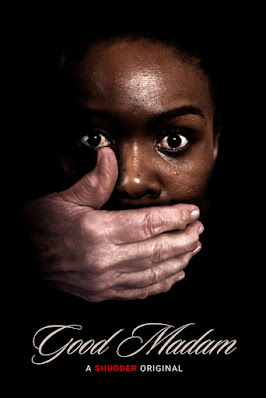According to hiis theme song: “He’s the man, the man who fights evil. He’s the man, the man who fights crime. He’s the man nobody can tie down.” Maybe the band credited as “Silver Threads” does not go as far as Isaac Hayes did describing John Shaft as a “sex machine” and a “bad mother,” but they clearly went for a similar vibe. Yet, this is not just another blaxploitation movie. It was the first South African-produced film featuring an all-black cast. Suppressed shortly after its 1973 premiere, it has been recently “rediscovered” (hardly forgotten, it spawned a1982 sequel) and freshly restored. Over fifty years later, Louis de Witt’s Joe Bullet returns to the big screen as a selection of the 2024 African Diaspora International Film Festival in New York.
South African must have a rough-and-tumble football tradition. considering ANC-breakaway politician Mosiuoa Lekota is still affectionately nicknamed “Terror” from his time on the pitch. However, the tactics unleashed against the Eagles club are beyond acceptable bounds. Fortunately, the Eagles president knows Joe Bullet, a very Shaft-like detective, because gangsters targeted his two best players, Jerry and Flash, trying to strong-arm them into switching to the Falcons club, right before the rematch of the Cup championship.
Obviously, Bullet must protect them, while lending a hand as a replacement for the trainer killed during the prologue. Of course, Bullet’s alpha-manliness inadvertently complicates matters when Jerry’s sort of girlfriend Beauty, the club president’s daughter, inevitably falls for the detective.
Sure, Joe Bullet is a derivative low-budget exploitation movie, but it is solidly enjoyable on those terms alone. However, it also represents some significant South African cultural history. It is recognized as the first South African film of its kind. Frankly, some reasonable, free-thinking Western viewers might be baffled by the censorship of the film, because it makes absolutely no political statements, explicit or implied. Presumably, the Apartheid government simply considered a black hero of Bullet’s strength, stature, and pride to represent a threat.
Still, lead actor Ken Gampu went on to become a trailblazing South African movie star (despite his weird open-palmed, slightly Gumpish running style). Gampu co-starred in two Golan-Globus Cannon films, King Solomon’s Mines and American Ninja 4: The Annihilation, as well as the breakout art-house hit The Gods Must Be Crazy, all which qualifies him as legendary.

























